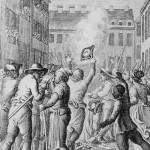Featured, Intorelable Acts or Coercive Acts, Timeline of British Acts on America »
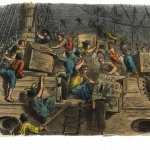
The Intolerable Acts also known as Coercive Acts were a package of five laws implemented by the British government with the purpose of restoring authority in its colonies. The first four Acts were passed as reprisal for the rebellion against the that led to the Boston Tea Party Protest.
The Intolerable Acts were a reprisal to the Boston Tea party rebellion.
The first act was The Boston Port Act which came into effect on March 31, 1774; it closed the port of Boston until the East India Tea company was repaid …
Timeline of British Acts on America, Townshend Acts »
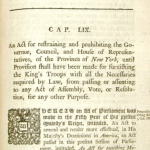
In 1766 Charles Townshend assumed the position of Chancellor of the Exchequer; he was an ally of Grenville and a strong supporter of colonial taxation, and decided to reattempt the collection of funds from British colonies.
In 1767 Townshend proposed a new set of measures known as the Townshend Acts. The Acts were passed in early June with an overwhelming support of parliament, and were to be effective on November 20th. After the the British had to show the colonies that Britain had the right to tax the colonies, raise …
Stamp Act »

Samuel Adams (1722-1803)
A graduate from Harvard College, unsuccessful businessman and tax collector, entered politics to coordinate efforts against as a leader of . The Sons of Liberty were responsible for the , he was portrayed as a master of propaganda. He was an official of the Massachusetts House of Representatives and one of the founding fathers of the United States. He was a cousin of President John Adams.
Samuel Adams
James Otis (1725-1783)
James Otis graduated from Harvard College. He was a top lawyer in Boston and became known as an opponent …
Stamp Act »
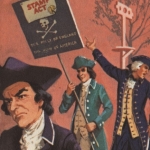
The was nullified before it went into effect and was repealed by parliament on March 18, 1766 under the Marquis of Rockingham.
In the summer of 1765 King George III fired George Grenville and replaced him with Charles Watson-Wentworth, Marquis of Rockingham. For the new Prime Minister the only alternative to repealing the tax was a long and costly civil war with the American colonies. Britain, as the world greatest power, could not give up on the decision to uphold the tax and give in to mobs and activist in its …
Documents, Stamp Act »
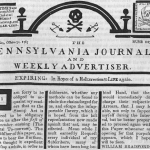
The original text of the 1765 Stamp Act from the British Parliament makes an interesting read despite its length. For example it lists some interesting items that have become subject to the tax. “And for and upon every pack of playing cards, and all dice, which shall be sold or used within the said colonies and plantations, the several stamp duties following. For every pack of such cards, the sum of one shilling. And for every pair of such dice, the sum of ten shillings.
Video »

It is March 5th, 1770 and tensions are boiling over between the people of Boston and the 2000 British troops that have been occupying the city since 1768. Nobody likes an occupying army and the soldiers were poorly paid and were competing for jobs with poorly paid Bostonians. The night of march 5th several hundred people gathered in front of Fenueil Hall. Angry people looking for trouble. Private Hugh White was standing on sentry duty and a group of young men came and harassed him. He calls for the main …
British Taxation in Colonial America, Timeline of British Acts on America »
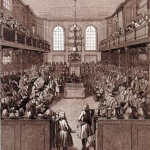
During the early seventeenth century Britain created a mercantile system to maintain close control and regulate trade of its colonies, they tried to make sure all revenues generated from the trade with its American colonies went back to the crown. This system did not allow its colonies to freely trade with other countries other than Britain. The first of its protective measures was the The law was designed to protect British economic interests in colonial trade and to protect its industry against the rapidly growing Dutch navigation trade, it …
Intorelable Acts or Coercive Acts »
The were a package of five laws implemented by the British government with the purpose of restoring authority in its colonies. The first four Acts were passed as reprisal for the rebellion against the 1773 that led to the Boston Tea Party Protest.
The first act was The Boston Port Act which came into effect on March 31, 1774; it closed the port of Boston until the East India Tea company was repaid for the destroyed tea. All shipping, landing or discharging of goods was prohibited in the area within the …


